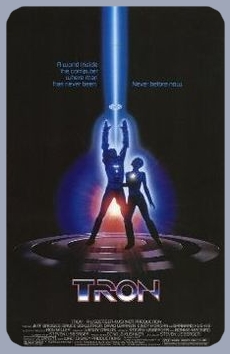Thoughts on TRON and Mirror Worlds
The Code Project Insider (the must-read daily developer news & humor newsletter) had a pointer to this post at On-lineCollege.org: The Top 10 Movies for Computer Science Students. Yes, all the obligatory "usual suspects" where there, including The Matrix, Hackers, and Wargames, etc. And, no surprise, TRON made the list.

I was glad that the article author used the TRON movie poster as the visual 'hook' for the article. However, I would put TRON at the top of the list rather than in the middle. Not that an actual relative rating is suggested by the author's list, rather, I believe TRON is in a class by itself when it comes to thoughtful movie-going for us computer-types. This is especially true for this film's use in Computer Science teaching (which is the point of the article and its posting at On-LineCollege.org).
In virtually (no pun intended) all of these other films, the computer technology is playing its own 'role', that is, just being computers. In TRON, however, we have a remarkable allegory that – while being somewhat loosely translated for mainstream cinema consumption – is all about 'software agency' and the relationship of the user to his/her programs. In particular, TRON captures better than any other source I know, the spirit of what David Gelernter wrote so remarkably about in his classic, Mirror Worlds (subtitled, Or the Day Software Puts the Universe in a Shoebox: How It Will Happen and What It Will Mean).

An important Big Idea of Mirror Worlds is the "Homunculus Effect" – that is, what happens when a computer simulation's input/output feeds are connected to the Real World it simulates? As Gelernter asserts, the simulation stops being a simulation and becomes, in effect, a god-like heads-up-display out-of-body view onto that Real World context.
If I was teaching a Computer Science class, I surely would use TRON and Mirror Worlds together. I would have students watch TRON first, then we'd engage in a group discussion about what it means and how they relate its story to their own experience and views on technology. Then we'd all read Mirror Worlds, watch TRON again, and have a second discussion to see how our insights evolve.
I encourage Comp Sci teachers to consider a TRON/Mirror Worlds 'unit' for your class. Or if you are simply a Triple-L'er – Life-Long Learner – you might enjoy streaming the TRON video and grabbing a copy of Mirror Worlds for a first or re-read if its been a while.
--Sohodojo Jim--
Cedar Rapids, Iowa USA
P.S. Historical/non-trivial-trivia post-script... It was the ideas so well captured in Mirror Worlds that made David Gelernter a target of the Unabomber. Thankfully his attack was unsuccessful in terms of death, but the letter-bomb was crippling for Dr. Gelernter. So for extra credit, I'd add that – while David Kaczynski is/was completely wrong in what he did – a read of his manifesto (actually entitled Industrial Society and Its Future) is worthwhile as discussion point/counterpoint.

